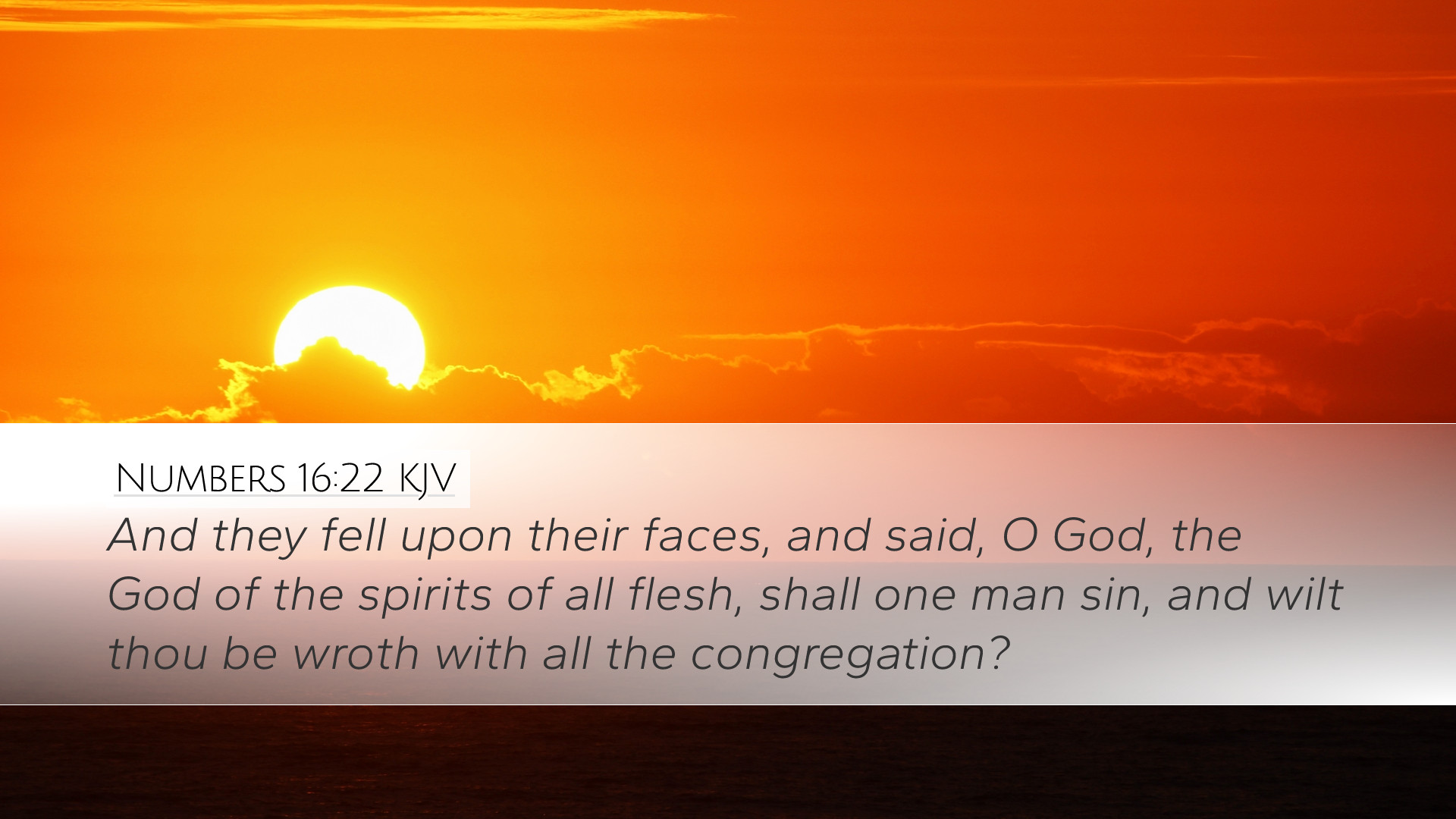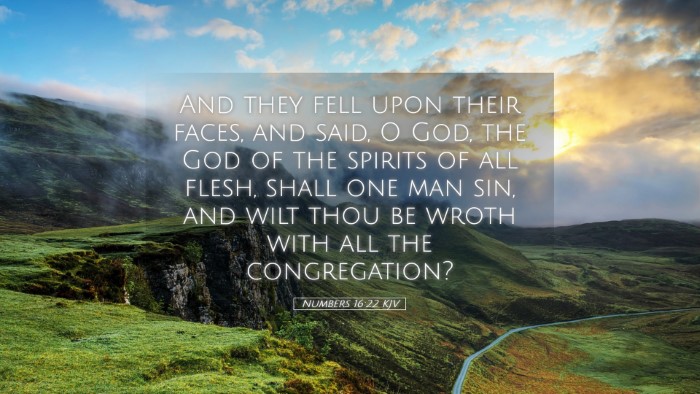Commentary on Numbers 16:22
Verse Summary: Numbers 16:22 states, "And they fell upon their faces, and said, O God, the God of the spirits of all flesh, shall one man sin, and wilt thou be wroth with all the congregation?" This verse captures the moment when Aaron and Moses intercede on behalf of the Israelites amidst a rebellion led by Korah.
Contextual Background
The rebellion of Korah, Dathan, and Abiram presented a significant challenge to the leadership of Moses and Aaron. The Israelites were wavering, led by these figures into dissent against God's appointed leaders. The events leading to this confrontation demonstrate humanity’s tendency to rebel against divine order.
Insights from Public Domain Commentaries
Matthew Henry's Commentary
Moses and Aaron's reaction to the challenge of their authority is profound. According to Henry, their immediate posture of falling on their faces signifies humility and earnestness in prayer. They recognize the gravity of the situation, understanding that the anger of God towards the congregation could lead to dire consequences.
Henry emphasizes the appeal made to God as "the God of the spirits of all flesh", suggesting that God has sovereignty over all life and a deep awareness of the hearts of men. This title highlights God's omniscience and omnipotence, reminding the leaders of His ability to discern the motivations behind the actions of His people.
Albert Barnes' Notes on the Bible
Barnes elaborates on the theological implications of this verse, noting that it reflects the deep intercessory role of Moses and Aaron. They plead with God not to punish the entire congregation for the sins of a few, indicating a strong element of collective responsibility in the community of Israel.
Furthermore, Barnes points out the profound question posed by Moses and Aaron: "Shall one man sin, and wilt thou be wroth with all the congregation?" This rhetorical inquiry underscores the principles of divine justice and mercy. It challenges readers to consider the balance between individual accountability and collective consequences.
Adam Clarke's Commentary
Clarke highlights the significance of the word "spirits" in the address to God. It signifies both the life force of individuals and their moral decisions. This understanding posits that God, as creator of all life, is deeply engaged with the spiritual states of all His creations.
Clarke also discusses the emotional weight of this intercession, reflecting the selflessness of Moses and Aaron as they put the wellbeing of the many above their own authority. Their concern for the community exemplifies true leadership, contrasting sharply with the selfish ambition demonstrated by Korah and his followers.
Theological Reflection
This verse provides rich material for theological reflection, particularly in exploring the nature of divine justice, intercession, and community dynamics. The plea of Moses and Aaron illustrates a crucial aspect of old covenant ministry — the leader's responsibility to mediate between a sinful people and a holy God.
As believers today reflect on this passage, they may consider how it applies to the leadership within the church. Pastoral responsibilities inherently involve intercession for the congregation, recognizing the weight of collective sin and the grace of God that covers it.
Applications for Pastoral Ministry
- Intercessory Prayer: The importance of prayer in spiritual leadership cannot be overstated. Like Moses and Aaron, leaders should intercede for their congregation, seeking God's mercy and guidance.
- Understanding God's Nature: Familiarity with the attributes of God, particularly His justice and mercy, equips leaders to approach challenging situations with wisdom and faith.
- Collective Responsibility: Encourage the church to embrace a sense of community responsibility, recognizing that individual actions can affect the entire congregation.
- Humility in Leadership: Leaders should exhibit the humility shown by Moses and Aaron, prioritizing the welfare of their people over personal interests.
Conclusion
Numbers 16:22 serves as a poignant reminder of the intricate balance between divine justice and mercy, as well as the calling of leaders to act on behalf of their people. As scholars, pastors, and congregants engage with this text, they are invited to reflect on the nature of intercession and the collective journey of faith within the community of believers.


